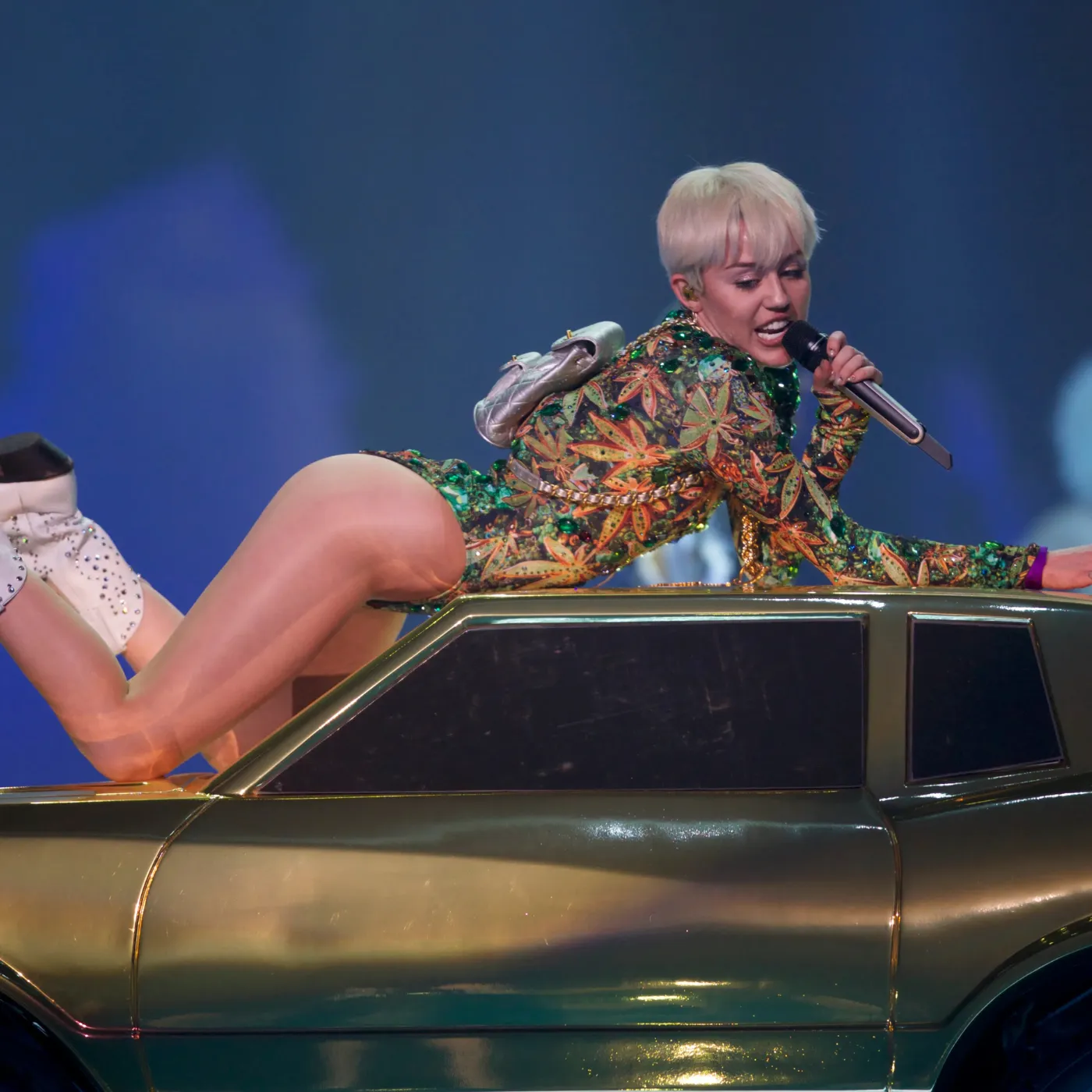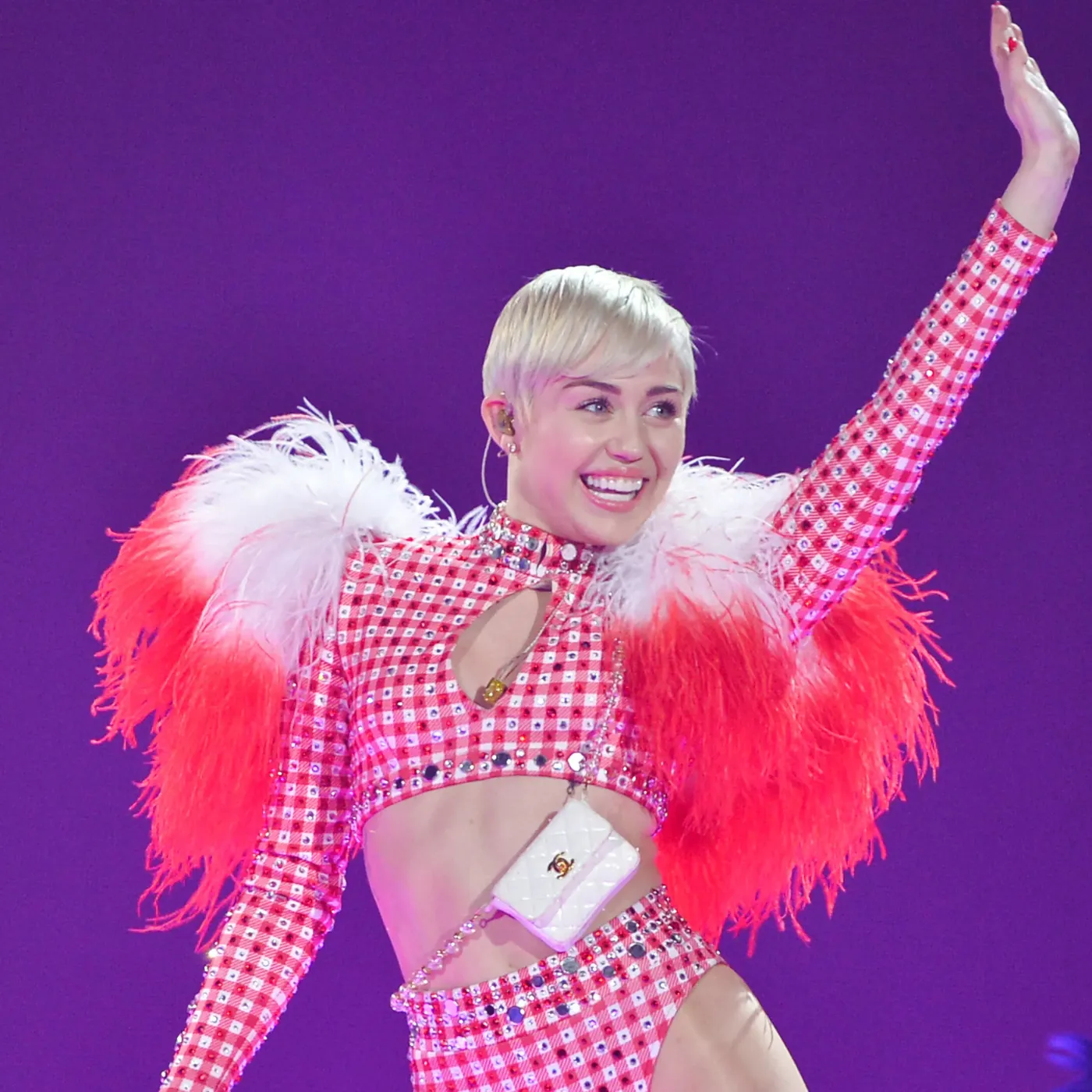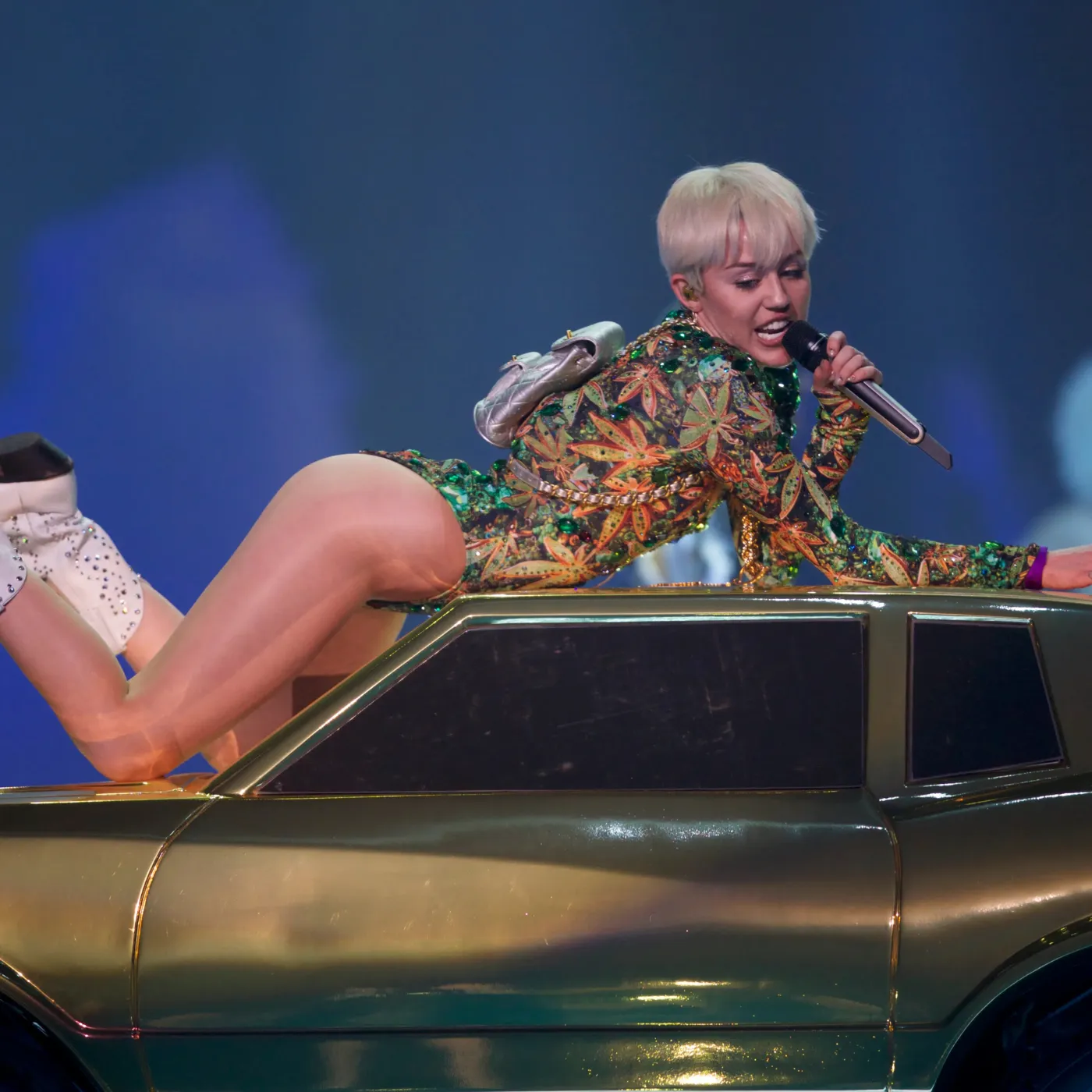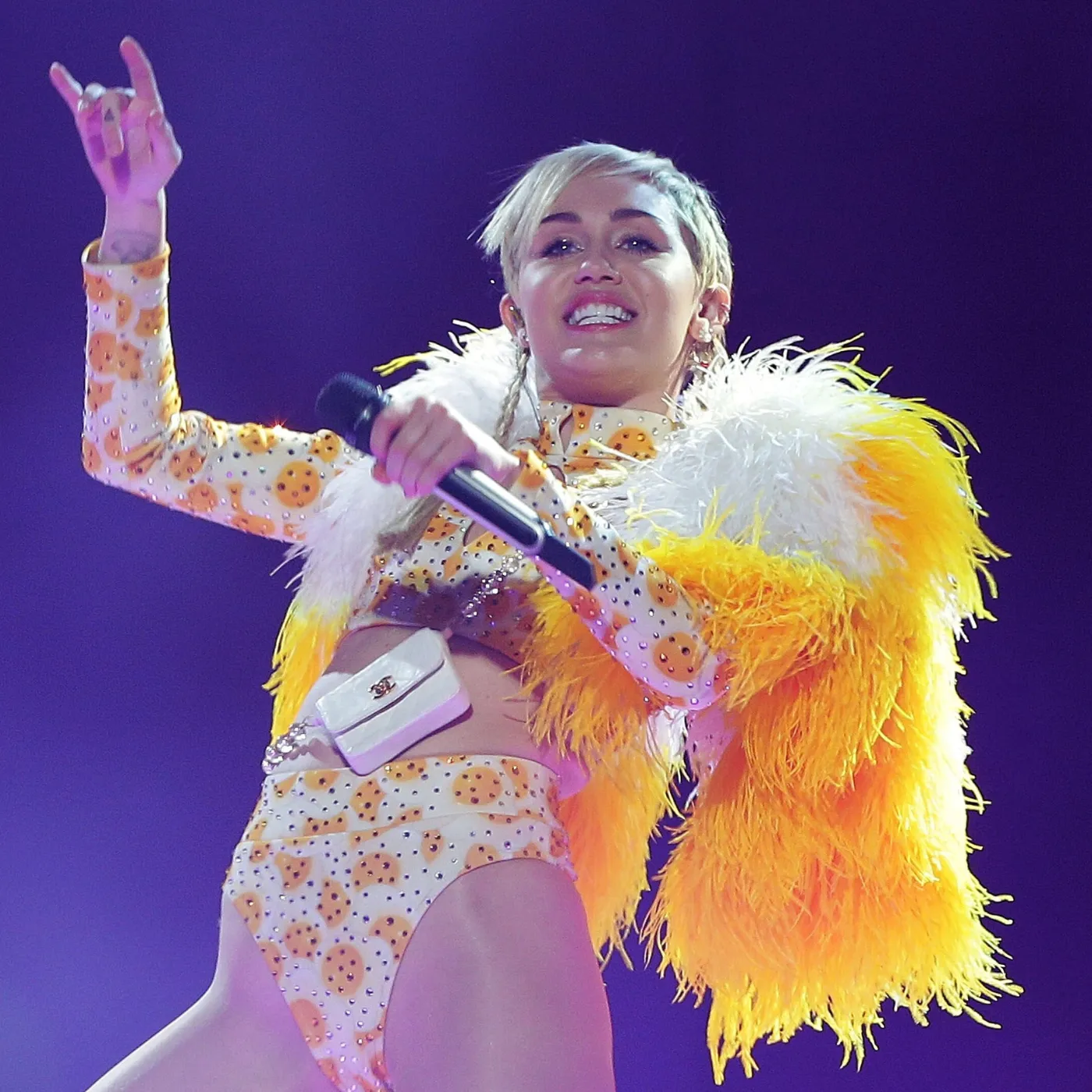

“I Lost Everything” — Miley Cyrus’s Darkest Chapter Finally Exposed
In a music industry built on reinvention, Miley Cyrus has never shied away from transformation. But in a raw and revealing moment, the former Disney Channel star admitted that her most iconic era—the neon-drenched, tongue-wagging chaos of “Bangerz”—came “at a devastating personal cost. Now, more than a decade later, she’s opening up about what really happened behind the glitter and shock value.

“I lost everything,” Cyrus confessed in a recent sit-down interview that sent shockwaves through the fandom and stirred intense online chatter. For fans who watched her evolve from Hannah Montana to the boundary-pushing pop icon of 2013, the revelation hit like a wrecking ball.
The Making of a Media Monster
When “Bangerz” dropped in 2013, Miley Cyrus was no longer the squeaky-clean child star the world once knew. She was a spectacle. A headline. A controversy magnet. The MTV VMA performance with Robin Thicke, the foam finger, the twerking—all of it became part of pop culture lore. But beneath the bold fashion, viral antics, and media frenzy, something was crumbling.
“It was a creative breakthrough and a personal breakdown happening at the same time,” one former insider shared anonymously. “She had the freedom she always wanted, but she was also surrounded by chaos.”
The public saw Miley riding high—chart-topping singles like “Wrecking Ball,” arena tours, collaborations with hip-hop icons, and constant social media virality. But few understood the toll it took on her psyche.
When Identity Becomes a Costume
“I felt like I had to keep performing even when the cameras were off,” Cyrus said. “That version of me wasn’t sustainable.”
The “Bangerz” aesthetic, with its candy-coated visuals and rebellious edge, was praised for redefining pop’s boundaries. But Cyrus now reveals that it became a prison of expectation.
“People only wanted that one version of me—the wild one, the unpredictable one,” she explained. “It was exhausting.”
She described feeling increasingly alienated from herself as the public demanded more spectacle, more viral moments, and more edge. The very image that reignited her career also consumed her identity.
Fallout: Behind the Fame
Cyrus has hinted before that the “Bangerz” era was bittersweet, but never this explicitly. In her latest interview, she opened up about losing friends, creative partnerships, and even her own sense of mental clarity.
“I burned a lot of bridges,” she admitted. “Some people thought it was empowering, but a lot of it was just reactionary. I was lashing out.”
Industry insiders say the post-“Bangerz” period was one of emotional and professional reset. One former tour producer described it as a “closed-door “fallout”—with management changes, label tensions, and creative exhaustion.
“She was everywhere, but she was also deeply lost,” one source close to the star commented. “The persona had taken over the person.”
Redemption or Rejection?
Now in her early 30s, Miley Cyrus is in a markedly different place. With recent projects like “Endless Summer Vacation” and “Flowers,” she’s repositioned herself as a more introspective artist, yet she can’t escape the shadow of her past.
“I look back, and I feel compassion for that version of me,” she said. “But I also feel sadness.”
The “Bangerz” era, for all its success, has become a cautionary tale. Critics continue to debate whether it was brilliant marketing or reckless self-exploitation. Fans remain divided—some praise her for breaking molds, others criticize her for chasing viral culture at the expense of authenticity.
But for Cyrus, the damage wasn’t theoretical. It was deeply personal.

The Industry’s Role in a Meltdown
What’s perhaps most alarming is how entertainment executives, media platforms, and even fans fed into the frenzy.
“Every time I did something outrageous, it went viral,” she noted. “So I kept going. The more unhinged I got, the more attention I received.”
Social media algorithms, 24/7 celebrity coverage, and a culture addicted to controversy created a feedback loop that pushed Cyrus to the brink.
“It’s not just about me,” she added. “The industry thrives on extremes. And sometimes, the artist gets lost in the algorithm.”
Where She Stands Now
In the aftermath of the chaos, Miley Cyrus has rebuilt herself—not just musically, but emotionally. She’s more private now, more reflective, and less eager to cater to trends.
“I don’t regret making ‘Bangerz,’ but I regret what I let it do to me,” she said.
She’s since reconnected with old collaborators, mended broken relationships, and found grounding outside of her public persona.
“I’ve learned to make space for myself that isn’t public,” she explained. “Fame is a mirror, and sometimes, what you see in it is terrifying.”
Fan Reactions: Divided and Devoted
The internet didn’t stay silent for long. As Miley Cyrus’s confession about her ‘Bangerz’ era breakdown rippled through social platforms, fans, critics, and casual observers rushed to weigh in—and the reactions have been nothing short of explosive.
Some long-time supporters expressed unexpected guilt, stunned that the chaos they once celebrated was, in fact, a mask for pain. “I feel bad now for how we hyped it all up without realizing she was struggling,” wrote one user, @cyrusfan777, in a now-viral thread on X (formerly Twitter). Another fan added, “We were too busy dancing to ‘We Can’t Stop’ to realize Miley couldn’t stop either—she was spiraling.”
Other fans took it even further—posting emotional TikToks revisiting their old Miley posters, crying to “Wrecking Ball,” and apologizing for not recognizing the warning signs. Some even called the “Bangerz” era a form of industry-sanctioned exploitation, blaming not just the media but themselves for enjoying what was, in retrospect, a very public unraveling.
But not everyone is convinced by her newfound clarity.
In fact, some reactions have been downright icy. Critics—many of whom claim to have been skeptical of the “Bangerz” transformation from the beginning—are calling her out for what they describe as retroactive victimhood. “She wanted the spotlight. Now she’s blaming it? Nah,” @rebelreview posted bluntly, igniting a thread of over 1,200 comments debating celebrity accountability versus survival mode branding.
Another user asked, “Was she forced to twerk at the VMAs?” Or did she know exactly what she was doing?”
The division is sharp, and it’s exposing something deeper. This isn’t just about Miley anymore—it’s about a generation of fans who watched stars break down in real-time and called it content. For many, this uncomfortable reckoning feels like a mirror held up to the very platforms that made viral meltdowns normal.
What the ‘Bangerz’ Era Really Meant—and Why It Still Hurts
Whether you were cheering her on or shielding your eyes in disbelief, Miley’s “Bangerz” chapter left a permanent scar on pop music—and on the way female celebrities are consumed, celebrated, and criticized.
To her defenders, “Bangerz” was the moment she seized autonomy from the squeaky-clean Disney past, burning Hannah Montana to the ground in favor of something raw, real, and rebellious. It was Miley taking back her voice—even if it was screaming.
To others, it was a cautionary tale dressed up as a comeback. Provocative performances, shock-value interviews, and the relentless visual branding of her tongue-out persona made headlines—but also raised questions: Who was really in control? And what did Miley actually gain from burning it all down?

In the end, perhaps even she doesn’t know. “I gave them everything,” she admitted quietly. “But I forgot to keep something for myself.”
That sentence struck a nerve. It echoed across fan pages, parenting blogs, mental health forums, and entertainment columns. Because behind all the neon, glitter, and foam fingers, there was always a girl trying to be heard—and maybe no one was really listening.
Miley Cyrus didn’t just survive “Bangerz.” She’s finally talking about it. And now, we have to decide what we’re willing to hear.


















